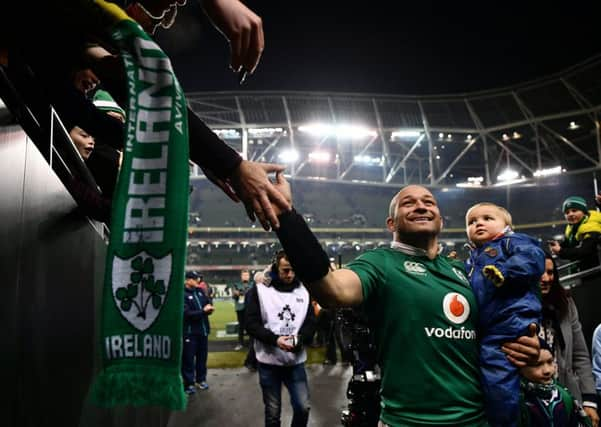Six Nations: Ireland are back to their best


An opening draw against Wales gave Ireland another point and they had a fairly comfortable win over their Celtic cousins in Dublin on the final weekend, maintaining the recent Irish dominance in the head-to-head against Scotland, but there was some disappointment in the third-place finish.
While Scotland were satisfied with a clear progression from the previous year’s whitewash, Ireland were left deflated by a title defence which ended up down and out in Paris and London.
Advertisement
Hide AdAdvertisement
Hide AdThe stark contrast of Ireland’s adaptation to the professional era in comparison to Scotland’s is a well-worn story but when the two countries meet to open this year’s staging of the world’s oldest international competition at BT Murrayfield on Saturday there is the feeling of a genuine match with no need for the prefix “mis” to be attached.
For those who grew up watching rugby in the late 1980s and 1990s there was a real sense that Scotland may never lose to Ireland again but that illusion was shattered in 2000 when the Brian O’Driscoll-led golden generation ran amok at Lansdowne Road and utterly changed the fixture’s dynamic.
Scotland have enjoyed the odd freak win in the intervening 17 years, such as the “foot and mouth match” which was put back to September 2001, the “Dan Parks match” at Croke Park in 2010 and the “29 per cent possession match” in 2013 when Scott Johnson’s side somehow managed to scramble a 12-8 victory. However, the rest has been an undeniable greenwash of Irish dominance and, for all the progress Scotland have made under Vern Cotter and the tangible optimism in the air, next weekend’s opening match is against one of the genuine contenders for the title.
Only champions England are favoured more by the bookies but Ireland’s Kiwi coach Joe Schmidt, pictured, pointed out: “We were 13/1 in a two-horse race against the All Blacks!” That incredible and historic victory in Chicago over what had seemed an unbeatable New Zealand side was a wake-up call to those who thought this Ireland team might be on the slide.
The 2015 World Cup was supposed to be Ireland’s moment but a brutal final pool victory over France, which left Schmidt with an eye-watering injury count, led to a quarter-final collapse against Argentina.
The provinces then struggled in the World Cup’s wake heading into last year’s competition but there are confident noises coming out of the Irish camp this year, with good reason. That was then, this is now.
“Last year we came off the back of the disappointing World Cup exit in the quarter-final, and those long-term injuries went right through the spine of the team,” said hooker and skipper Rory Best.
“Also when you look at the club performances in Europe, we all struggled, so there wasn’t that same confidence and spring in the step.”
Advertisement
Hide AdAdvertisement
Hide AdBest’s Ulster may have fallen at the last Champions Cup pool-stage hurdle when they lost to Exeter, but traditional European heavyweights Leinster and Munster have returned to the knockout stage after a quiet few years. Filling the boots of the legendary Paul O’Connell must have been a daunting prospect but Best has grown into the captaincy, with that famous 40-29 toppling of the All Blacks at Soldier Field in November no doubt giving the hooker a feeling that he belongs in the leadership role. His goals are high, but his feet remain firmly on the ground.
“When you captain a side you always dream of lifting silverware but we know that as soon as one guy in our collective starts to look beyond Scotland at Murrayfield, or halfway into the Six Nations, or the end, that’s when your performance starts to suffer,” said the 34-year-old.
For a change, European success is not confined to his side of the Giant’s Causeway and Best has been suitably impressed with the Scottish clubs this season.
He said: “It makes a massive difference. There’s no doubt in the PRO12 that Glasgow have been one of the toughest sides to beat for a few years. But when you’re taking that step to the quarter-final, and do it under a bit of pressure, you know, where they lost to Munster at home and then went down to Leicester needing to win and produced that kind of performance… having played there it doesn’t matter what Leicester team you get when they are home at Welford Road they are very, very tough to beat.
“So the manner in which Glasgow qualified – and Edinburgh too after they qualified for the Challenge Cup quarter-finals – they have be confident because they’re playing some quality rugby. The national team played some quality stuff in November and when you couple that together it makes them a very hard team to beat.”